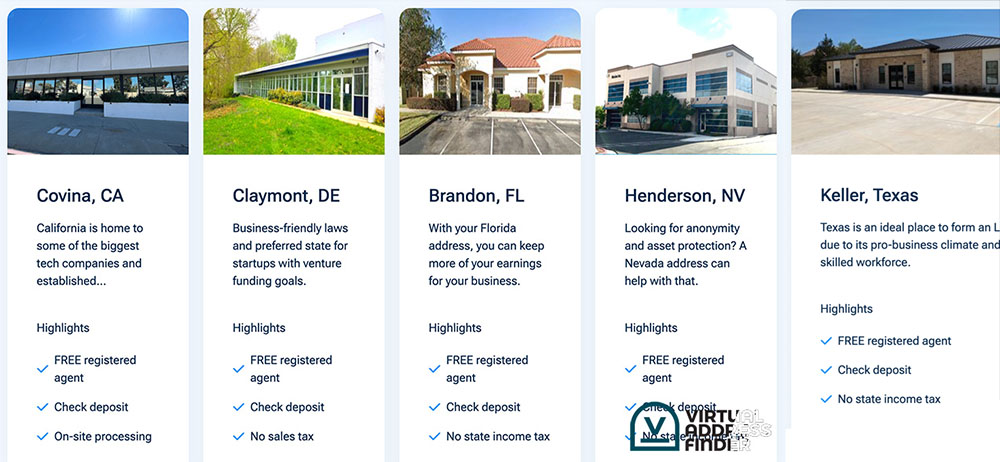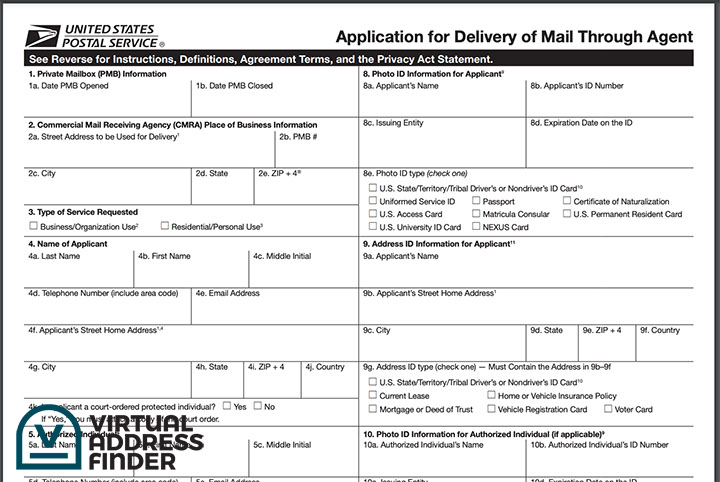As a seasoned business owner, I’m often asked: “Should I use my home address as the business address?”
It’s a tempting idea because it’s convenient and cost-free. But this seemingly simple decision can have far-reaching consequences for your privacy, credibility, and business success – the impact of which you may not realize until years down the road.
In this guide, I’ll dive deep into the hidden pitfalls of using your home address for business, introduce smarter alternatives, and show you how to make a seamless transition.
Key Takeaways
In the end, virtual business addresses offer a professional and secure alternative, providing the benefits of a prestigious location without the cost of physical office space.
Click to jump to a specific section, or scroll down to continue reading.
Setting up a Business Address
When starting a new business, there are numerous decisions to be made, and one of the most critical is choosing a registered business address.
A business address is not just a physical location; it’s a representation of your company’s identity and professionalism. As a business owner, it’s essential to understand the importance of a business address and the various options available.
Many small businesses today don’t have a physical location, so often it feels like listing your home address is the only option. There are alternatives, and we will explore the different types of business addresses, including virtual business addresses, physical addresses, and post office boxes, to help you make an informed decision for your business.

Whether you’re a media business, an e-commerce business or an information business that doesn’t have a brick and mortar location, all such small business owners should consider exactly how they set up their registered business.
But why not use a residential address?
The Downsides of Home-Based Business Addresses
First, let’s take a look at the potential drawbacks of using your home address as a registered office address. Brace yourself, as it’s not as harmless as it might seem.
Companies need to choose appropriate addresses for their registered office to avoid privacy concerns and legal issues. Using a residential address for business registration can lead to significant drawbacks such as privacy concerns and the impact on professional image.
Privacy Risks
The most consequential risk of using your home address as your business address is the loss of privacy. Once your address is on public record, it’s accessible to anyone from cold callers to persistent marketers.
And trust me, the moment you register your business, these marketers come out of the woodwork.
Consider the implications of listing your home address on your company website or Google My Business listing. This exposure extends beyond you to your family, potentially compromising their safety and peace of mind.
It is crucial to keep your personal address private to avoid privacy issues and protect your personal information from being accessible to customers and employees.
As your business grows, so does its visibility, and with it, the associated risks. Take, for instance, an e-commerce business run from home. A seemingly minor delayed shipment or a denied return could escalate quickly. In extreme scenarios, you might find yourself face-to-face with a disgruntled customer on your doorstep, turning a professional dispute into a personal confrontation.
Furthermore, publicizing your home address blurs the line between your professional and personal life. Creditors, business partners, or even employees might feel entitled to reach you at any hour. I could list a hundred more awkward and embarrassing scenarios that could emerge from doubling your home as your office.
Legal Complications
Legal issues add another layer of complexity when using a home address for business.
First, your home could be reclassified as a commercial property for tax purposes. Depending on local zoning laws, you might require licenses or special permits, and failure to comply could result in fines or cease-and-desist orders. It is also crucial to understand zoning restrictions for home-based businesses to avoid legal complications.

Tenants face additional hurdles, as many landlords prohibit commercial activities in residential properties. Not to mention, if you plan to establish a business in New York but live in Serbia, you can’t use your home address due to jurisdictional differences. Zoning restrictions can significantly impact business operations, making it essential to be aware of local regulations.
Mixing your home and business address could also undermine the liability protection offered by an LLC.
Credibility Concerns
One commonly overlooked disadvantage of using your home address as your business address is the potential hit to your credibility and professionalism.
It’s not uncommon for customers and partners to do a lookup of a business address to see what kind of office building you use. With a residential home, potential customers or investors may perceive your business as unstable, temporary, and low-budget, even if that’s far from the truth.
Displaying a personal address on a website and other marketing materials diminishes your credibility in so many ways, emphasizing the importance of maintaining a professional image through appropriate address usage.
This perception can be particularly damaging if you’re aiming for higher-end clients or to secure venture capital funding. While you may consider listing your home address as a pragmatic choice, it can signal that you’re not fully committed to the business.
Mail Handling Mayhem
No one wants their living room transformed into a paper jungle, personal letters entangled with business contracts, bills camouflaged among invoices.
This postal madness is a very likely outcome when using a home address for business. As your mailbox overflows with an assortment of personal and professional mail, the chances of misplacing important documents skyrocket. Mixing personal and business mail at the same address can lead to overwhelming amounts of paperwork and increase the risks of legal and financial liabilities.

Just a single misplaced invoice or overlooked legal notice could spiral into missed deadlines or compliance nightmares, potentially dulling your business reputation.
Despite your best segregation efforts, the sheer volume of mixed mail creates a constant battle of high-stakes hide-and-seek, where losing implies more than a misplaced letter. It could turn into lost opportunities or even problematic legal headaches.
Address Options for Your Business
When selecting a business address, there are several options to consider.
- Physical Office Address: If you do have a dedicated office space, this can easily act as a proper physical address for your business.
- Co-Working Space: If you rent space in a co-working facility, you can check to see if they allow members to list the address on official documents.
- Virtual Address: Virtual business address services can provide a professional address for your business, allowing you to separate your personal and business life. Additionally, mail forwarding services can help you manage your business mail and packages, ensuring that you receive important documents in a timely manner.
- P.O. Box: Although not the best option in terms of professionalism for a business, a P.O. Box from the post office is a better alternative than a home address.
At the end of the day, all you really need to consider is which address can satisfy the legal requirements of your business.
Official Business Address Requirements
When registering your business, you will need to provide an official business address known as a “registered address.”
This address will be used for receiving important documents, such as tax returns and legal notices, and will be listed on public records.
It’s essential to choose a business address that meets the requirements of your state and local government. Whether it’s a P.O. Box, an office address or a virtual address, the only requirement is that it needs to be an actual physical address. As a business owner, it’s crucial to understand the official business address requirements and choose an address that meets your specific needs.
Virtual Business Addresses: A Professional & Secure Option
Given the many drawbacks of using a home address as a business registered address, many entrepreneurs, including myself, have turned to virtual business addresses, a safer and private alternative.
A virtual business address acts like a physical address where you can receive mail and packages (learn more about how a virtual address works). More importantly, whenever someone searches your address on Google, they’ll witness an actual office in a prestigious business location.

Using a virtual office address not only maintains your privacy but also enhances your business’s professional image, with some offering additional services like mail forwarding and live receptionists.
The example above shows the virtual business addresses offered by VirtualPostMail. These offices also have staff that receives your mail and handles things like mail scanning, mail forwarding, shredding junk mail, and even check depositing.
Not only are virtual business addresses much safer than using your home address, but they are also astronomically cheaper than renting or staffing a physical office space. In many cases, you can get a virtual business address for less than $20/mo, although there are numerous factors that play into how much a virtual address costs.
Any startup, freelancer, or remote team can opt for a virtual business address to run their business from without publicizing their home address.
Furthermore, virtual address services offer business addresses in several states and cities (check for virtual addresses in your US state), so you can select the one that suits your needs and conduct business from anywhere.
How to Start Using a Virtual Business Address
The concept of a virtual business address is still fairly new, and many small business owners may need to familiarize themselves with how to transition to this system.
Using virtual business address services can also help delegate administrative tasks, allowing you to focus on growing your business without getting bogged down in routine operations.
But it’s actually a breeze. Let me walk you through the steps to set up a virtual business address in no time.
- Pick a provider: The virtual business address industry has many options with different offerings like mail forwarding, scanning, and check depositing. Some of my top picks are Traveling Mailbox, iPostal1, and Postscan Mail. All of these providers offer addresses in multiple cities. Pro tip: Zero in on your preferred location and compare plans to snag the best deal.
- Complete paperwork: Depending on your chosen provider, you may need to fill out a form or two, like Form 1583, which authorizes your chosen provider to act as your registered agent service and handle your mail.

- Prepare for the grand reveal: Once you’ve got your shiny new virtual business address, it’s time to spread the word. Notify all clients and partners about your new address and ensure that all your legal documents, official paperwork, and business website reflect your new virtual address.
Balancing Convenience and Professionalism
So should you use your home address for your business registered agent’s address?
Generally speaking, we advise against it as it can potentially impact your privacy, legal standing, and professional image. Just as you wouldn’t invite the IRS to your family dinners, it’s equally unwise to invite business-related risks into your personal space.
Using a home business address can also affect how customers perceive your business, potentially viewing it as less professional. Additionally, there are legal considerations to keep in mind, as the legality of using a home address varies depending on your business structure and local regulations.
Instead, join the club of savvy entrepreneurs who leverage virtual business addresses as registered agent services to keep their businesses looking sharp.
While this may seem inconvenient at first, it’ll bring you far more ease in the long run in terms of enhanced privacy to improved credibility.
FAQs – Virtual Business Addresses
Let’s get to the hot questions that keep new business owners up at night when they’re considering using their home address for business purposes.
Generally, you’re in the clear to use your home address to register your business. But hold your horses if you’re dealing with regulated items like booze, food, or things that go boom (like chemicals). And if you’re planning to run a daycare facility from your home, you might want to look into a commercial address. The law’s got a funny way of being picky about this stuff.
Virtual business addresses typically cost between $10 and $100, depending on the provider, location, and amenities. Premium locations, like London, will bump up the price, and more robust virtual office plans with offerings like meeting room access will also cost more. Personally, I’ve found iPostal1 to be one of the more affordable options for most locations.
Josh Summers is a writer and entrepreneur who has been using a virtual mailbox for both personal and business use while living in Asia for the past 10 years. In addition to using multiple services, he has actually visited a number of virtual address locations to better understand how the industry works and what’s most important to consider.
